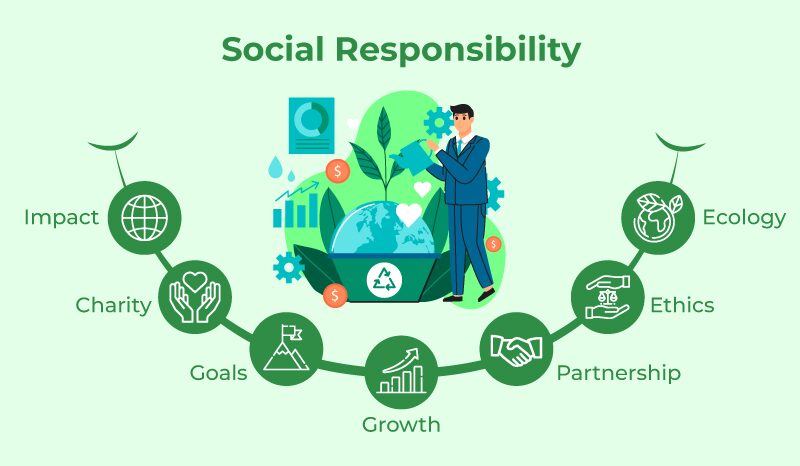Corporate Social Responsibility or CSR is one of the most practiced techniques among businesses to make their company well-liked among the target audience on the pretext of serving humanity. This help companies to work for communities and bigger cause.
While the whole strategy can help us to make the place a better place to live, CSR can greatly help businesses if they leverage PR. Read on to learn PR role in the program, how CSR marketing can change the game of a business, and how you can create a program.
Page Contents
What is CSR in Public Relations?

Building corporate social responsibility is important for businesses. The relationship between CSR and PR is imperative; businesses need to communicate any tangible steps they need to take that reflect their beliefs and ethical foundation. However, it’s a challenging task for PR professionals. They need to find ways to tell about their efforts of giving back to the community authentically and honestly without making it noticeable that companies are pursuing CSR as a marketing strategy.
Fortunately, business communication becomes easier and more approachable when they use CSR tactics for the right reasons. Brands need to opt for the efforts they believe in and not only for a publicity stunt. Your target audiences, like Gen Z and millennial consumers, can easily identify the difference. Once a business initiates strategy, the work of PR will begin. The PR professionals will communicate your efforts and disseminate your endeavors to show your brand in a positive light. They will use different methods to inform people about your efforts and attract them to your brand.
For instance, a shoe brand decides to donate a pair of shoes to children on every hundred sales. Keep in mind; they do this because they believe in helping children, and not just to get popular among people. Also, their PR team markets their efforts to engage people so that they purchase their shoes to help more people. PR experts will reach out to as many people as possible so that everyone can work together for a better cause.
So, if you plan to practice CSR for your brand, you must work environmental, social, or economic cause that you truly believe in. This will help you avoid looking at a self-promotional PR strategy.
How to Build CSR Program for Your Business?
Define Corporate Social Responsibility

When businesses practice CSR, they do things in a way that positively impacts society. It generally includes an environmental, economic, or social component. Besides that, companies need to monitor, measure, and improve their social impact as a whole. If you want to build a CSR program, you need to consider the impact you want your company to have on society. This will give you a direction to start your journey toward a CSR program.
Understand CSR Benefits to Your Company
Each company has a different goal they are working towards, so some might not immediately see the advantage of a CSR program. However, if you understand how this program can benefit your employees, clients, and community, you are more likely to incorporate it into your business. Take your time to understand how deeply it can help everyone.
Decide a Baseline for Your CSR Program
Businesses don’t need to just start donating millions of dollars to make their CSR program successful. Start with what you already have to build a sustainable program. For instance, you can donate a percentage of your sales yearly to a community organization. Or you can give free products to specific consumers to help them. Every business needs to figure out what makes sense to their organization.
Look for Unique Opportunities Relevant to Your Company’s Objective and Mission

The simplest way to find opportunities for your CSR program is to consider the company’s mission. Is your mission to make financial services accessible to everyone? Is your mission to promote good health among children, or do you want children to have access to education?
Establishing a CSR program with the objectives you want to work for makes things easier for you. You feel more motivated to work for it as well as your employees and stakeholders. Also, since you will be doing something you always advocate, you will look genuine and authentic to people.
Use PR to Reach Your Audience
Once you implement your CSR strategy, your PR team will look for ways to market your brand. They will tell the story of your successful CSR program to people so they can join hands with you to help others. They might use social media strategies, organize an event, or opt for other techniques.
With PR tactics, your CSR program can offer you great benefits, such as:
- They will improve customers’ perception of your business.
- PR retains current employees and attracts skilled people in the market.
- It boosts your appeal to investors.
- They can help you restore your public image.
- PR for CSR programs can lead to great sales.
Measure the Success of Your Business

Measuring the success of your efforts may differ based on your type of program. Note that some benefits will be tangible such as growth or revenue. But there will come no tangible benefits that will be equally important such as boosting employee morale or gaining consumers’ trust. You may have to work short-term, but the CSR program will offer you long-term benefits.
Bottom Line
In a nutshell, its a business strategy to gain the attention of the target audience, boost the morale of employees, and retain stakeholders. This helps not only businesses but also society. The CSR program ensures to work for a bigger cause that can be environmental, social, or economical to help people in a community. While apparently, our society will benefit from CSR; it will offer long-term benefits to businesses by building brand awareness, recognition, and brand identity.





